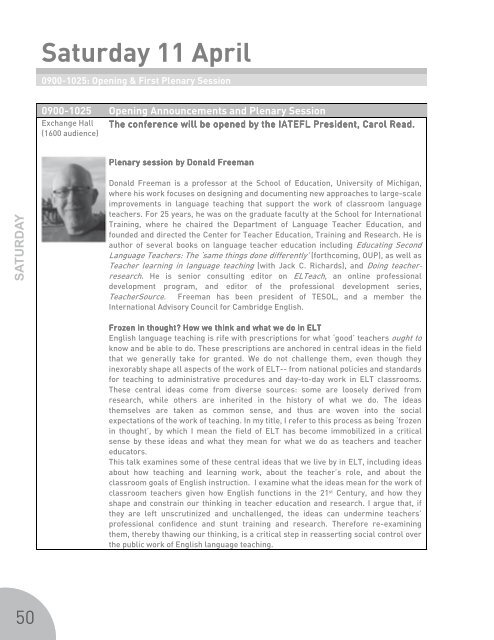You also want an ePaper? Increase the reach of your titles
YUMPU automatically turns print PDFs into web optimized ePapers that Google loves.
Saturday 11 April<br />
0900-1025: Opening & First Plenary Session<br />
0900-1025 Opening Announcements and Plenary Session<br />
The conference will be opened by the IATEFL President, Carol Read.<br />
Exchange Hall<br />
(1600 audience)<br />
Plenary session by Donald Freeman<br />
SATURDAY<br />
Donald Freeman is a professor at the School of Education, University of Michigan,<br />
where his work focuses on designing and documenting new approaches to large-scale<br />
improvements in language teaching that support the work of classroom language<br />
teachers. For 25 years, he was on the graduate faculty at the School for International<br />
Training, where he chaired the Department of Language Teacher Education, and<br />
founded and directed the Center for Teacher Education, Training and Research. He is<br />
author of several books on language teacher education including Educating Second<br />
Language Teachers: The ‘same things done differently’ (forthcoming, OUP), as well as<br />
Teacher learning in language teaching (with Jack C. Richards), and Doing teacherresearch.<br />
He is senior consulting editor on ELTeach, an online professional<br />
development program, and editor of the professional development series,<br />
TeacherSource. Freeman has been president of TESOL, and a member the<br />
International Advisory Council for Cambridge English.<br />
Frozen in thought? How we think and what we do in ELT<br />
English language teaching is rife with prescriptions for what ‘good’ teachers ought to<br />
know and be able to do. These prescriptions are anchored in central ideas in the field<br />
that we generally take for granted. We do not challenge them, even though they<br />
inexorably shape all aspects of the work of ELT-- from national policies and standards<br />
for teaching to administrative procedures and day-to-day work in ELT classrooms.<br />
These central ideas come from diverse sources: some are loosely derived from<br />
research, while others are inherited in the history of what we do. The ideas<br />
themselves are taken as common sense, and thus are woven into the social<br />
expectations of the work of teaching. In my title, I refer to this process as being ‘frozen<br />
in thought’, by which I mean the field of ELT has become immobilized in a critical<br />
sense by these ideas and what they mean for what we do as teachers and teacher<br />
educators.<br />
This talk examines some of these central ideas that we live by in ELT, including ideas<br />
about how teaching and learning work, about the teacher’s role, and about the<br />
classroom goals of English instruction. I examine what the ideas mean for the work of<br />
classroom teachers given how English functions in the 21 st Century, and how they<br />
shape and constrain our thinking in teacher education and research. I argue that, if<br />
they are left unscrutinized and unchallenged, the ideas can undermine teachers’<br />
professional confidence and stunt training and research. Therefore re-examining<br />
them, thereby thawing our thinking, is a critical step in reasserting social control over<br />
the public work of English language teaching.<br />
50


